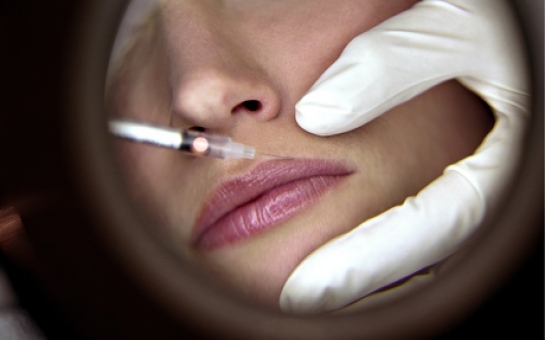When this week's figures were published, surgeon Laurence Kirwan commented: "We should move the discussion on from the interminable hand-wringing as to whether it is morally acceptable and just accept it. Rather like motor cars, electricity and gay marriage." Except, the purchase of a car doesn't involve general anaesthetic and a sharp knife to the tit. Except, gay marriage is an example of the pursuit of equality, rather than thinner thighs. Except, electricity companies do not advertise solely to the vulnerable, with cheaper heating packages for the recently divorced, or those raw from childbirth. It promises lighter living rooms, rather than successful relationships, or happiness.The rise in demand for surgery is surely at least partly a response to the way it is advertised. The seasonal promotions, the advertisements carefully targeted to fuel and exploit people's poor body image, ads (like Harley Medical's tweet suggesting a "#boobjob" as an "original Christmas present") that normalise and trivialise unnecessary surgery, with grinning bikini models and their white white smiles.After the PIP scandal, a series of restrictions were recommended, but one – a clampdown on advertising – was dismissed. The Department of Health instead promised to "better enforce existing codes", a judgment that "horrified" the president of the British Association of Aesthetic Plastic Surgeons. Because it won't work. The Advertising Standards Association is reactive, rather than proactive, meaning that clinics will publish ads that they know will be banned, but, in the short time they remain up, will have paid for themselves. In December, 52% of the top Google-ranked clinics were still advertising "luxury perks" as inducements for surgery, and 37% of the incentives were time-sensitive, to pressure people into booking quickly.I received an email this week about Valentine's Day. "More than two-thirds of women say they welcome receiving a cosmetic treatment gift from their significant other on Valentine's Day," it read, quoting a poll conducted by the Good Surgeon Guide. Its audience rated "which non-surgical treatments they would love to receive on lover's day" – the top five were: dermal fillers, Botox, teeth whitening, a skin peel and lip enhancements. Each of which says, "I love you" in its own special, "He Hit Me (and It Felt Like a Kiss)" way.Our poor bodies. What chance do they have, pelted with all these tiny bombs? When this year Alan Sugar invested in his Apprentice's "Botox empire"? When iTunes sold an app for children in which the user played a liposuction doctor? Few of us are immune to advertising, and most of us are anxious about the way we look, and it is this combination that leads us by the hand to the lunchtime clinics, to the ends of needles. Prescription medicines are not allowed to advertise, yet cosmetic surgery is. That's bananas. Especially when we have seen women's breasts exploding with faulty implants and can clearly plot the tension between the goal of ads (cash) and public health.Yet nobody is surprised that more people are going for surgery. Because as it is normalised, and advertised, and as more people choose it, yet more will choose it, and any concept of an alternative – a life trying to get happier in our skin – will dim. We are starting to forget.(theguardian.com)ANN.Az
Is cosmetic surgery now a normal part of modern life?
Society
22:00 | 10.02.2014

Is cosmetic surgery now a normal part of modern life?
Nobody is surprised that the number of people having cosmetic surgery continues to rise. No eyebrows have been raised. Nor are people surprised that 90% of the 50,122 people treated (that feels like the wrong word, never mind) in Britain last year were women. Nobody is surprised to note this creeping acceptance of surgery, of a rise in eyelid operations, earlobe lifts, people cutting out photos of celebrities to show the doctor, and asking for a more "Winslettey" chin.
Follow us !










